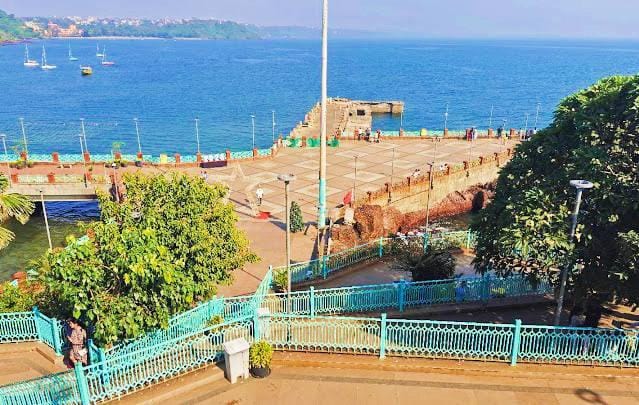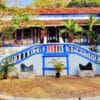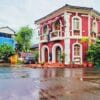
Dona Paula Beach is one of Goa’s most iconic coastal destinations, located 7 km from Panaji, at the confluence of the Zuari and Mandovi rivers. Famous for its scenic beauty, water sports, and legendary love stories, it blends natural charm with rich cultural history.
1. Historical Background
A. Portuguese Colonial Era (16th–20th Century)
- Named After: Dona Paula de Menezes, a Portuguese noblewoman known for her charitable work and social service.
- The beach and surrounding area were named in her honor following her death in 1682 and burial at the Cabo Chapel.
Legend of Dona Paula
- Myth 1: Dona Paula was the daughter of a Portuguese Viceroy who fell in love with a local Goan fisherman. Forbidden to marry him, she leapt from the cliffs into the sea. Her spirit is said to haunt the area, especially on moonlit nights.
- Myth 2: She was a philanthropist who donated land to religious institutions, such as the Carmelite nuns. The village was named in appreciation of her generosity.
Note: Both stories are folklore. While Dona Paula was real, there’s no historical record of a tragic love affair or haunting.
- Historical Fact: The village was originally a small fishing hamlet under Portuguese rule and later evolved into a prominent residential and tourist area.

B. Post-Liberation Era (1961–Present)
- 1960s–70s: Dona Paula became a favorite of the hippie crowd and backpackers during Goa’s free-spirited boom.
- 1980s–90s: Rose to national fame after being featured in films like Ek Duuje Ke Liye (1981), reinforcing its reputation as a romantic destination.
- 2000s–Present: Transformed into a hub for water sports, luxury stays, and leisure tourism.
2. Cultural & Tourist Significance
A. The Dona Paula Jetty & Viewpoint
- Iconic Sculpture: The “Image of India” or “Mother and Son” statue near the jetty, created by Bartholomeu Costa and Joaquim Figueiredo, symbolizes the nation’s maritime legacy — often mistaken for Dona Paula herself.
- Panoramic Views: Offers stunning vistas of the Arabian Sea and Mormugao Harbour, especially at sunset.

B. Water Sports & Activities
- Adventure Hub: Jet-skiing, parasailing, windsurfing, and banana boat rides are popular.
- Dolphin Watching: Tours available to spot Indo-Pacific humpback dolphins offshore.
C. Pop Culture & Media
- Bollywood Connection: Featured in several films, including:
- Ek Duuje Ke Liye
- Dil Chahta Hai
- Singh Is Kinng
- Literary Mentions: Referenced in novels like The Sea of Poppies by Amitav Ghosh.

3. Myths vs. Reality
| Myth | Reality |
|---|---|
| The beach is haunted by Dona Paula’s ghost. | No historical evidence supports this; it is folklore. |
| Dona Paula committed suicide over a forbidden love. | Romanticized legend — not supported by records. |
| The beach was named after Dona Paula Amaral Antonio de Souto Maior. | Incorrect name. The beach is named after Dona Paula de Menezes. |
4. Nearby Attractions
- National Institute of Oceanography (NIO): Features marine exhibits and scientific displays.
- Cabo Raj Bhavan: Goa’s Governor’s Residence, formerly a Portuguese fort.
- Salim Ali Bird Sanctuary: Located nearby on Chorao Island — home to diverse bird and mangrove species.

5. Visitor Information
- Best Time to Visit: October to March (ideal weather and sea conditions).
- Timings: Beach is open 24/7; water sports run from 9:00 AM to 5:00 PM.
- Entry Fee: Free access; charges apply for water sports and boat rides.
How to Reach
- From Panaji: 15-minute drive via MG Road.
- Public Transport: Kadamba buses, auto-rickshaws, and rental bikes/taxis available.

6. Environmental Concerns
- Erosion Issues: Rising sea levels and development have led to coastal wear and erosion.
- Plastic Pollution: Local NGOs and tourism bodies are conducting regular cleanup drives to preserve the beach’s beauty.
Conclusion
Dona Paula Beach is not just about sun and sea—it’s a fascinating blend of history, legend, romance, and modern tourism. Whether you’re chasing a myth, watching dolphins, or enjoying adventure sports, it remains one of Goa’s must-visit destinations.








Add comment